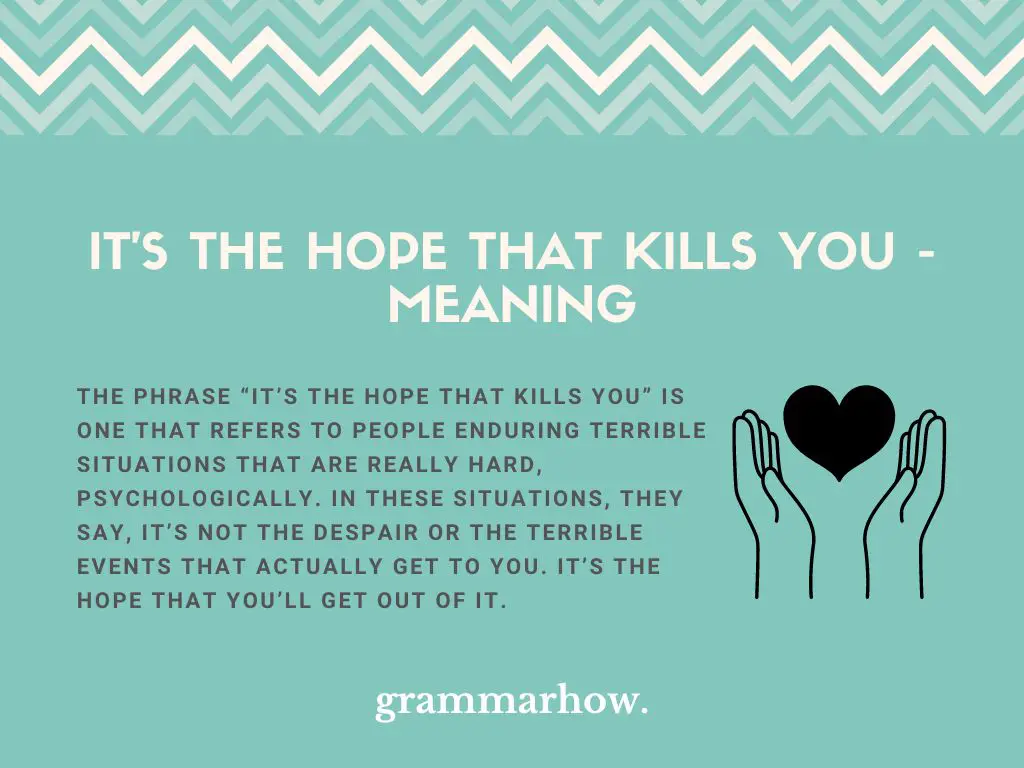A very poetic phrase that you can sometimes see pop up, particularly in fiction, is “it’s the hope that kills you”. What is this phrase referring to, exactly? Why is it the hope that kills you? And where does it come from? This article will explain all of these questions.
It’s the Hope That Kills You – Meaning
The phrase “it’s the hope that kills you” is one that refers to people enduring terrible situations that are really hard, psychologically. In these situations, they say, it’s not the despair or the terrible events that actually get to you. It’s the hope that you’ll get out of it.

The idea is that you’d have an easier time if you had no hope at all, which is why many people in these sort of psychologically taxing situations end up letting go of hope entirely.
Therefore, people use “it’s the hope that kills you” when they’re talking about how difficult a situation they had to endure was, to the point that the worst thing about it was their hope.
How to Use “It’s the Hope That Kills You” in a Sentence
“It’s the hope that kills you” is a common phrase, and it’s one worth learning about, in case you ever find yourself in need of using it in real life, or in a story you’re writing. Here are some example sentences that showcase the proper way to use it:
- People misunderstand all the time, because it’s not the depression, it’s the hope that kills you.
- You see, it’s not the despair, the despair I can deal with, it’s the hope that kills you.
- It’s the hope that kills you, not the terrible times, but the hope that they’ll be over eventually.
- It’s the hope that kills you when you’re lying awake at night, trying to think about better times.
- You don’t get it, it’s not going to be the torture or the solitude, it’s the hope that kills you instead.
- It’s the hope that kills you, not anything else but the hope that your hell will eventually end.
- It’s the hope that kills you, in the end, not anything about the process but the hope it’ll be over.
It’s the Hope That Kills You – Origin
It’s hard to trace a specific origin to “it’s the hope that kills you”, so we don’t have a precise origin for it. It’s a phrase that you can find a lot in popular culture, whether it’s Shakespeare or Ted Lasso, but we don’t know where it comes from.
It’s the Hope That Kills You – Synonyms
“It’s the hope that kills you” is a phrase that talks about the useless feeling of hope that, in hard situations, can make these scenarios even harder to sit through. There are other ways in the English language to express this, so here are some synonym sentences:
- It’s the feeling that it’s going to be over eventually that does you in.
- The worst thing isn’t the torture, but the feeling that it’s going to end.
- Hoping is the worst part about it all, never trust hope.
- When you end up trusting in hope, you’re guaranteeing that they will break you.
- You have to work to avoid getting broken, by avoiding hope.
Correct Ways to Say “It’s the Hope That Kills You”
The phrase “it’s the hope that kills you” is prevalent enough in popular culture that there is more than one way to use it. Here, we have collected some of the more common alternative phrasings for “it’s the hope that kills you”:
- It’s not the despair that kills you, it’s the hope.
- The hope is the worst part, the hope is what kills you.
- Hoping will get you killed in these situations.
- You should avoid hoping because the hope is what will kill you.
In What Situations Can You Use “It’s the Hope That Kills You”?
“It’s the hope that kills you” is a phrase that is meant to be applied to situations that are incredibly damaging to a person. When you’re living through one of these situations, it is said that what will kill you isn’t the events, but the hope that they will end.
Therefore, we say “it’s the hope that kills you” to convey the idea that, when you’re going through an awful situation, the hope that it will end will kill you because the situation won’t end.

Martin holds a Master’s degree in Finance and International Business. He has six years of experience in professional communication with clients, executives, and colleagues. Furthermore, he has teaching experience from Aarhus University. Martin has been featured as an expert in communication and teaching on Forbes and Shopify. Read more about Martin here.
